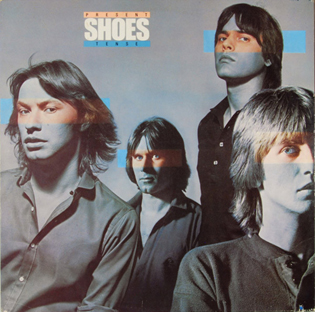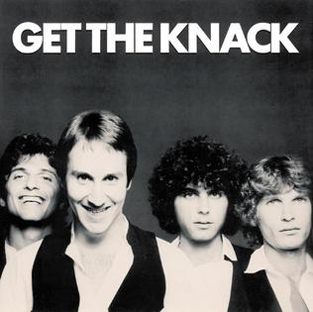SHOES
 |
 |
Pt. 2: Younger than Today
by Ed Turner
(June 2020)
Summer, 1979. For a period of five consecutive weeks, Get the Knack maintains its stronghold at No. 1 on the Billboard 200 album chart. With sales figures approaching stratospheric heights, Get the Knack becomes the fastest-selling debut album in history, breaking a record previously held only by The Beatles ( 1964's Meet the Beatles) - a defining moment in pop culture (Meet the Knack sold more copies than Get the Beatles!), and one that will blow Doug Feiger's mop topped mind, now encircled by a halo of spinning Rickenbacker 12-strings.
If Get the Knack is truly a "concept album about teenage lust," as Fieger once put it, then "Good Girls Don't," side one's closing track, functions as the record's State of the Union Address. In a moment of twisted, songwriting inspiration, Feiger would cleverly subvert a bit of teen sloganeering - GOOD GIRLS DON'T. - by replacing a period with a comma. Suddenly, GOOD GIRLS DON'T was no longer a Forward, March battle cry; in Field Marshall Feiger's hands ( "Good girls don't, / but I do" ), the lyrics would become agitprop for the romantically disenfranchised, the last to take up arms... for those, and for all who had once surrendered, waging a forgotten war across a continent as vast and lonely as an empty hallway. In commercial terms, the song hadn't done too badly, either. Released as the follow-up to their monster first single, "My Sharona" (1979's No. 1 song), "Good Girls Don't" reached No. 11 in the US.
Fast forward; September, '79. Present Tense, Shoes' second major label release - following 1977's Black Vinyl Shoes - arrives in record stores. While Get the Knack was both celebration and lament for an imaginary adolescence, Present Tense was a meditation on the possibility of love - romantic love - in a broken world; a song cycle of fulfillment and loss that stands today as Shoes' masterpiece. I was 17 when Present Tense was released, though it would be another four years before I found the album, before I discovered it for myself.
Let me tell you about it - how that happened.
I'll tell it to you the way it happened to me, and maybe then you'll understand. Maybe then you won't think I'm nuts when I tell you that the day eventually came when I couldn't live without that album. And I will tell you. But I want to get everything in the right order. I don't want to leave anything out. So I guess I'd better start at the beginning...
It was midnight when I reached the edge of town. The ragged end of nowhere. I pulled off the road at the Hi-Lo Club ; the one place - the only kind of place - still serving that hour of the morning. Another two-bit dive, no different than the last. I wondered if the one I'd find myself in tomorrow, or the day after, would be any different...
But how could it be different? How can anything...?
I wondered what the hell it mattered, anyway. I decided it didn't. And I went inside.
I sat down at the bar, and ordered a beer. Music blared over the PA system, and a scantily-clad waitress made her way - bumping and grinding - around the tables and customers. Above the nickel-plated beer taps, a television set flickered.
I'd no sooner paid for my drink when, three or four seats down, a woman slid onto one of the red-cushioned, high-topped bar stools, her purse clutched tightly in her lap. I hadn't seen her come in, and I watched as she tossed the purse onto the counter and fumbled a pack of cigarettes and a gold lighter from one of the side-pockets.
She was wearing large, horn-rimmed glasses, and appeared to be in her mid to late forties; her hair tightly-curled, peppered with grey. Smallish, with a compact, nicely-rounded figure.
She ordered a mixed drink, and after she'd gotten the bartender's attention, I signaled that I was ready for another beer when he could get around to it.
She swiveled in her seat and stared at me for a moment, looking across the row of bar stools between us.
I smiled.
She smiled, then swiveled back to the bar.
After I'd paid the bartender, I glanced over at her again. And when I glanced at her, she glanced back at me, and... And why not ? I thought. I mean, Why the hell not! Picking up my beer, I moved three seats down, and joined her.
"What's your name?" I asked.
She sat looking at me - studying me, rather. She didn't seem particularly pleased, or, for that matter, surprised. Then again, she didn't appear to be entirely disappointed, either. v "Pat," she answered.
"Well, my name's Ed," I told her. I extended a hand.
She smiled and turned away from me, nodding to the bartender for a refill.
Finish this beer and leave, I thought. Make no apologies - just do it.
I upended the bottle.
"Look!" she hissed. She was tugging at my arm, and giggling.
I set the beer down.
Pat was pointing to a couple on the dance floor. "That man doesn't know what he's doing," she whispered. "He doesn't know how to lead. That's not dancin'!"
I looked again. Of course, I wouldn't know good dancing if it walked up and slapped me in the face.
Pat was frowning disturbedly, as if the couple were practicing "outlaw" dance steps, or something similarly ludicrous.
"You see," she began - and something in her voice changed then - something in the quality of it - and I could sense that she was gearing up for some kind of extended monologue, sounding more like a redneck than ever. "I feel on safe ground with my dancin'. I feel comfortable with myself when I'm dancin'. When I'm dancin', I like to interrelate with my dance partner, and..."
Several times, over the next twenty minutes, I tried to cut in on Pat's seemingly endless stream of verbal diarrhea. She told me about the man she'd been seeing - an independently wealthy, amateur golfer ("I respect him as a dance partner"). She pontificated on the merits of the aggressive male ( "If you're waitin' for the woman to approach you, you're either gonna get a desperate woman, or one who doesn't give a damn about herself, or anyone else!"). In short, she talked. On and on and on, saying nothing...
Finally, when my patience was beginning to near its end, I broke in on her, rudely. I asked her if perhaps she wouldn't like to dance. I asked her this while she was in the middle of a sentence.
Pat shrugged elaborately. "If you want to," she yawned, gazing around the bar disinterestedly. "I'd just as soon leave, myself. Go someplace else."
I stood up, handed Shirley her purse.
"Let's go," I said.
We walked out to the parking lot.
"You'll have to drive," she said, once we were outside. "I don't have a license. Shit, I had to walk down here all the way from the house tonight, on account of my friend, Maxine, she couldn't take me 'cause she had to keep her kids."
She lived on a mostly deserted street, in an admittedly run-down neighborhood.
I turned into a dirt driveway, and rolled to a stop. Pat flung her door open. "Come on," she said, stepping out of the car and slamming the door shut behind her.
I followed her across a ragged sweep of yard - nothing more than hardpan and weeds - and we climbed the creaking wooden steps leading up to the porch.
Pat opened the front door - a battered screen door, badly in need of paint, hanging half off its hinges.
She walked ahead of me as I held the door for her.
"Kids, I'm home!" Pat announced.
I came in behind her as, all around us, children came running. There must've been seven or eight of 'em, ranging in age from three to nine. They were dirty, shabbily-dressed, undernourished. Frantically, they tugged at their mother, some crying, some laughing - all begging for attention.
" Go back to bed!" Pat yelled, tearing away from the throng and motioning for me to follow. "Mommy's busy. Go back to bed," she called over her shoulder.
Shrugging listlessly, the children did as they were told. Those that didn't have bedrooms to return to, I noticed, simply curled up on the floor in the hallway.
I followed Pat into the kitchen . She opened a pantry door and began rearranging breakfast cereal boxes on a shelf. She moved them this way and that, stacking some on top of each other. I wondered what in the hell she was doing. Finally, from the very back of the pantry she removed a small, brown paper bag.v She placed the bag on the counter top and opened it carefully. Then, producing rolling papers from her purse, she rolled three fat joints.
I drew a chair up from the kitchen table and sat down.
Pat finished rolling the joints, returned the dope to its hiding place. Then, she walked across the kitchen, and disappeared through a door into another part of the house. In another moment, music came blaring from a hi-fi system.
Pat returned, singing along, oblivious to the thundering volume.
I clapped my hands to my ears, as the children came running.
Also see our 2004 interview with Shoes